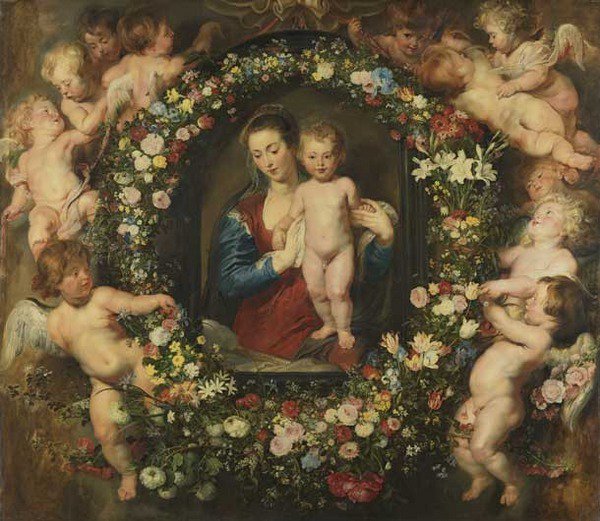Brueghel
dal 21/3/2013 al 15/6/2013
Segnalato da
21/3/2013
Brueghel
Alte Pinakothek, Munich
Paintings by Jan Brueghel the Elder. Not just 49 paintings painted by the aritst himself, but also several major works including "Harbour Scene with Christ Preaching", "View of a Seaport with the Continence of Scipio" and "Large Fish Market".

Curated by Dr. Mirjam Neumeister
Jan Brueghel the Elder is considered one of the most important Flemish
painters of the early 17th century along with Peter Paul Rubens. Unlike his
brother Pieter, who orientated himself closely on the works of his famous
father, Pieter Bruegel the Elder, Jan developed his own individual style at
an early stage that, with small-format landscapes, true-to-life floral
paintings and allegories rich in detail, was to play a ground-breaking role in
Flemish Baroque painting.
The holdings in the Alte Pinakothek in Munich, which document the many
facets of Jan Brueghel the Elder’s work, are unparallelled anywhere in the
world. These comprise not just 49 paintings painted by the aritst himself,
but also several major works including ‘Harbour Scene with Christ
Preaching’, ‘View of a Seaport with the Continence of Scipio’ and ‘Large
Fish Market’. Some paintings were created in cooperation with other
painters such as ‘Virgin in a Flower Garland’, which Jan Brueghel worked
on with his artist friend Peter Paul Rubens, and the magnificent ‘Seasons’
cycle that he created together with Hendrik van Balen. On top of this, the
exhibition showcases the painterly output of a whole artist family, as the
Bayerische Staatsgemäldesammlungen also own works by Pieter Bruegel
the Elder, Pieter Brueghel the Younger and Jan Brueghel the Younger,
including the famous ‘Four Continents’ series – one of the highlights in the
Alte Pinakothek – by Jan van Kessel, Jan Brueghel the Elder’s grandson.
Major loans
In the exhibition, the holdings in Munich will be complemented by the loan
of exceptional works from international museums. ‘The Vision of St. Hubert’
is being lent by the Prado in Madrid which, together with ‘Flora and Zephyr’
from Schloss Mosigkau (Kulturstiftung DessauWörlitz), is another
prominent example of the cooperation between Jan Brueghel and Rubens.
The loan from the Szépművészeti Múzeum in Budapest is one of the
fascinating Hell scenes; the Uffizi Gallery in Florence is represented by a
Calvary painting by Jan Brueghel the Elder.
Other highlights include exquisite drawings by Jan Brueghel the Elder, with
informal yet accurate studies of birds (Herzog Anton Ulrich-Museum,
Brunswick), a harbour scene (The British Museum, London), as well as
works of great artistic precision like ‘Harbour with Fish Market’ from a
private collection in Germany. ‘Mountainous Landscape with a Seaport’
(Museum Boijmans Van Beuningen, Rotterdam) and ‘Scipio’s Tomb’ from
the Louvre in Paris document Brueghel’s time in Italy. This selection is
supplemented by prints from the Staatliche Kunstsammlungen Dresden,
the Staatliche Graphische Sammlung München and the Albertina in Vienna,
as well as from other major lenders.
Scientific analyses
All works in the holdings in Munich have been closely analysed over the
past few months in cooperation with the conservators at the Doerner
Institut. X-ray photographs and infrared reflectography have revealed
underdrawings and pentimenti. Examination under the stereo microscope
has provided information on the painting process and the artists’
characteristic brushwork that has enabled attributions to be re-evaluated
at the same time.
The exhibition documents the results of these examinations. This also
includes an interesting insight into how workshops operated. Jan Brueghel
created his pictorial compositions in an informal, almost modern painterly
style by outlining his motifs with just a few simple lines and accentuating
brushwork. This facilitated the efficient production of pictorial compositions
rich in detail which invite the viewer on a journey of discovery.
With its presentation of works by Jan Brueghel the Elder, seen within the
context of the artistic output of his family and his contemporaries, the
Munich exhibition does not just provide an overview of his multifaceted and
detailed pictorial compositions, but also a fascinating insight into the
production of artworks in Antwerp around 1600.
Press contact:r
Tine Nehler M.A. T 089 23805-118 or e-mail presse@pinakothek.de
Press preview: 21.03.2013, 11.00
Opening: 21.03.2013, 19.00
Duration of exhibition: 22.03.-16.06.2013
Alte Pinakothek
Barer Strasse 29 Munich
Hours: daily except Mon 10.00–18.00 | Tues. 10.00–20.00
Admission: "Perugino – Raphael’s Master" (incl. the special exhibition ‘Treasures from the Depot’) 7 euros | concessions 5 euros
Combined ticket, Alte Pinakothek 12 euros | concessions 9 euros
Audio guide in German and English 3 euros



